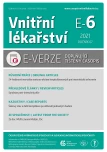-
Medical journals
- Career
Post-intensive care syndrome
Authors: Otakar Pšenička; Jarmila Křížová
Authors‘ workplace: 3. interní klinika, VFN a 1. LF UK v Praze
Published in: Vnitř Lék 2021; 67(E-6): 8-12
Category: Review Articles
Overview
Thanks to advances in intensive care, number of patients discharged from intensive care units is increasing. Along with that, there is also growing interest in long-term outcomes monitoring. A large proportion of patients suffers from cognitive, psychiatric and physical disabilities after discharge from intensive care unit. A set of these disabilities is called Post-intensive care syndrome (PICS). Along with patients, also their relatives could be affected, especially by mental disorders (PICS-Family, PICS-F). Long term or permanent consequences can lead to the loss of self-sufficiency, reduced quality of life, frequent rehospitalizations and numerous other health and economical consequences. A set of preventive procedures, applied during ICU hospitalization, is essential in preventing the development of PICS. In particular, prevention of extensive sedation, delirium management and early mobilization and thorough rehabilitation is needed. A much discussed topic is further outpatient monitoring of discharged patients in various post-intensive care facilities.
Keywords:
intensive care – Quality of life – critical disease – post-intensive care syndrome
Sources
1. Needham DM, Davidson J, Cohen H et al. Improving long-term outcomes after discharge from intensive care unit: report from a stakeholders' conference. Crit Care Med. 2012 Feb; 40(2): 502–9. doi: 10.1097/CCM.0b013e318232da75.
2. Davidson JE, Jones C, Bienvenu OJ. Family response to critical illness: postintensive care syndrome-family. Crit Care Med. 2012 Feb; 40(2): 618–24. doi: 10.1097/ CCM.0b013e318236ebf9.
3. Pandharipande PP, Girard TD, Jackson JC et al. BRAIN-ICU Study Investigators. Long - -term cognitive impairment after critical illness. N Engl J Med. 2013 Oct 3; 369(14): 1306 – 16. doi: 10.1056/NEJMoa1301372.
4. Iwashyna TJ, Ely EW, Smith DM et al. Long-term cognitive impairment and functional disability among survivors of severe sepsis. JAMA. 2010 Oct 27; 304(16): 1787–94. doi: 10.1001/jama.2010.1553.
5. Sakusic A, O'Horo JC, Dziadzko M et al. Potentially Modifiable Risk Factors for Long-Term Cognitive Impairment After Critical Illness: A Systematic Review. Mayo Clin Proc. 2018 Jan; 93(1): 68–82. doi: 10.1016/j.mayocp.2017.11.005.
6. Wade DM, Howell DC, Weinman JA et al. Investigating risk factors for psychological morbidity three months after intensive care: a prospective cohort study. Crit Care. 2012 Oct 15; 16(5): R192. doi: 10.1186/cc11677.
7. Fan E, Dowdy DW, Colantuoni E et al. Physical complications in acute lung injury survivors: a two-year longitudinal prospective study. Crit Care Med. 2014 Apr; 42(4): 849–59. doi: 10.1097/CCM.0000000000000040.
8. Hermans G, Van Mechelen H, Clerckx B et al. Acute outcomes and 1-year mortality of intensive care unit-acquired weakness.A cohort study and propensity-matched analysis. Am J Respir Crit Care Med. 2014 Aug 15; 190(4): 410–20. doi: 10.1164/rccm.201312–2257OC.
9. Needham DM, Wozniak AW, Hough CL et al. National Institutes of Health NHLBI ARDS Network. Risk factors for physical impairment after acute lung injury in a national, multicenter study. Am J Respir Crit Care Med. 2014 May 15; 189(10): 1214–24. doi: 10.1164/rccm. 201401–0158OC.
10. Hopkins RO, Suchyta MR, Farrer TJ et al. Improving post-intensive care unit neuropsychiatric outcomes: understanding cognitive effects of physical activity. Am J Respir Crit Care Med. 2012 Dec 15; 186(12): 220–8. doi: 10.1164/rccm.201206–1022CP.
11. Bienvenu OJ, Colantuoni E, Mendez-Tellez PA et al. Cooccurrence of and remission from general anxiety, depression, and posttraumatic stress disorder symptoms after acute lung injury: a 2-year longitudinal study. Crit Care Med. 2015 Mar; 43(3): 642–53. doi: 10.1097/CCM.0000000000000752.
12. Griffiths J, Hatch RA, Bishop J et al. An exploration of social and economic outcome and associated health-related quality of life after critical illness in general intensive care unit survivors: a 12-month follow-up study. Crit Care. 2013 May 28; 17(3): R100. doi: 10.1186/cc12745.
13. Latronico N, Bolton CF. Critical illness polyneuropathy and myopathy: a major cause of muscle weakness and paralysis. Lancet Neurol. 2011 Oct; 10(10): 931–41. doi: 10.1016/ S1474–4422(11)70178–8.
14. Morandi A, Brummel NE, Ely EW. Sedation, delirium and mechanical ventilation: the 'ABCDE' approach. Curr Opin Crit Care. 2011 Feb; 17(1): 43–9. doi: 10.1097/MCC. 0b013e3283427243.
15. Balas MC, Vasilevskis EE, Olsen KM et al. Effectiveness and safety of the awakening and breathing coordination, delirium monitoring/management, and early exercise/mobility bundle. Crit Care Med. 2014 May; 42(5): 1024–36. doi: 10.1097/ CCM.0000000000000129.
16. Barreto BB, Luz M, Rios MNO et al. The impact of intensive care unit diaries on patients' and relatives' outcomes: a systematic review and meta-analysis. Crit Care. 2019 Dec 16; 23(1): 411. doi: 10.1186/s13054–019–2678–0. doi: 10.1186/s13054–019–2678–0.
17. Stollings JL, Caylor MM. Postintensive care syndrome and the role of a follow-up clinic. Am J Health Syst Pharm. 2015 Aug 1; 72(15): 1315–23. doi: 10.2146/ajhp140533.
18. Lasiter S, Oles SK, Mundell J et al. A Scoping Review of Interventions and Outcomes. Clin Nurse Spec. 2016 Jul-Aug; 30(4): 227–37. doi: 10.1097/NUR.0000000000000219.
19. Farley KJ, Eastwood GM, Bellomo R. A feasibility study of functional status and follow - -up clinic preferences of patients at high risk of post intensive care syndrome. Anaesth Intensive Care. 2016 May; 44(3): 413–9. doi: 10.1177/0310057X1604400310.
20. Mistraletti G, Umbrello M, Mantovani ES et al. A family information brochure and dedicated website to improve the ICU experience for patients' relatives: an Italian multicenter before-and-after study. Intensive Care Med. 2017 Jan; 43(1): 69–79. doi: 10.1186/cc7769.
Labels
Diabetology Endocrinology Internal medicine
Article was published inInternal Medicine

2021 Issue E-6
Most read in this issue- Post-intensive care syndrome
- Schock and other complications after being bitten by a poisonous snake
- 24-hours mortality in seniors hospitalised with medical conditions
- Za doc. MUDr. Janem Malým, CSc.
Login#ADS_BOTTOM_SCRIPTS#Forgotten passwordEnter the email address that you registered with. We will send you instructions on how to set a new password.
- Career

